There’s a barrel-organ carolling across a golden street
And the music's not immortal; but the world has made it sweet
And fulfilled it with the sunset glow;
And it pulses through the pleasures of the City and the pain
That surround the singing organ like a large eternal light;
And they’ve given it a glory and a part to play again
In the Symphony that rules the day and night.
And now it’s marching onward through the realms of old romance
And trolling out a fond familiar tune,
And now it’s roaring cannon down to fight the King of France,
And now it’s prattling softly to the moon,
And all around the organ there’s a sea without a shore
Of human joys and wonders and regrets;
For what the cold machinery forgets. . . .
Yes; as the music changes,
Like a prismatic glass,
It takes the light and ranges
Through all the moods that pass;
Dissects the common carnival
Of passions and regrets,
And gives the world a glimpse of all
The colours it forgets.
And there La Traviata sighs
Another sadder song;
And there Il Trovatore cries
A tale of deeper wrong;
And bolder knights to battle go
With sword and shield and lance,
Than ever here on earth below
Have whirled into—a dance!—
Go down to Kew in lilac-time, in lilac-time, in lilac-time;
Go down to Kew in lilac-time (it isn’t far from London!)
And you shall wander hand in hand with love in summer’s wonderland;
Go down to Kew in lilac-time (it isn’t far from London!)
The cherry-trees are seas of bloom and soft perfume and sweet perfume,
The cherry-trees are seas of bloom (and oh, so near to London!)
And there they say, when dawn is high and all the world’s a blaze of sky
The cuckoo, though he’s very shy, will sing a song for London.
The Dorian nightingale is rare and yet they say you’ll hear him there
At Kew, at Kew in lilac-time (and oh, so near to London!)
The linnet and the throstle, too, and after dark the long halloo
And golden-eyed tu-whit, tu-whoo, of owls that ogle London.
For Noah hardly knew a bird of any kind that isn’t heard
At Kew, at Kew in lilac-time (and oh, so near to London!)
And when the rose begins to pout and all the chestnut spires are out
You’ll hear the rest without a doubt, all chorussing for London:—
Come down to Kew in lilac-time, in lilac-time, in lilac-time;
Come down to Kew in lilac-time (it isn’t far from London!)
And you shall wander hand in hand with love in summer’s wonderland;
Come down to Kew in lilac-time (it isn’t far from London!)
And then the troubadour begins to thrill the golden street,
In the City as the sun sinks low;
And in all the gaudy busses there are scores of weary feet
Making time, sweet time, with a dull mechanic beat,
And a thousand hearts are plunging to a love they’ll never meet,
Through the meadows of the sunset, through the poppies and the wheat,
In the land where the dead dreams go.
Verdi, Verdi, when you wrote Il Trovatore did you dream
Of the city when the sun sinks low,
Of the organ and the monkey and the many-coloured stream
On the Picadilly pavement, of the myriad eyes that seem
To be litten for a moment with a wild Italian gleam
As A che la morte parodies the world's eternal theme
And pulses with the sunset-glow.
There's a thief, perhaps, that listens with a face of frozen stone
In the City as the sun sinks low;
There's a portly man of business with a balance of his own,
There's a clerk and there's a butcher of a soft reposeful tone.
And they're all of them returning to the heavens they have known:
They are crammed and jammed in busses and—they're each of them alone
In the land where the dead dreams go.
There's a very modish woman and her smile is very bland
In the City as the sun sinks low;
And her hansom jingles onward, but her little jewelled hand
Is clenched a little tighter and she cannot understand
What she wants or why she wanders to that undiscovered land,
For the parties there are not at all the sort of thing she planned,
In the land where the dead dreams go.
There's a rowing man that listens, and his heart is crying out
In the City as the sun sinks low;
For the barge, the eight, the Isis, and the coach's whoop and shout,
For the minute-gun, the counting and the long dishevelled rout,
For the howl along the tow-path and a fate that's still in doubt,
For a roughened oar to handle and a race to think about
In the land where the dead dreams go.
There's a labourer that listens to the voices of the dead
In the City as the sun sinks low;
And his hand begins to tremble and his face to smoulder red,
As he sees a loafer watching him and—there he turns his head
And stares into the sunset where his April love is fled,
For he hears her softly singing, and his lonely soul is led
Through the land where the dead dreams go.
There's an old and haggard demi-rep, it's ringing in her ears,
In the City as the sun sinks low;
With the wild and empty sorrow of the love that blights and sears,
Oh, and if she hurries onward, then be sure, be sure she hears,
Hears and bears the bitter burden of the unforgotten years,
And her laugh's a little harsher and her eyes are brimmed with tears
For the land where the dead dreams go.
There's a barrel-organ carolling across a golden street
In the City as the sun sinks low;
Though the music's only Verdi there's a world to make it sweet
Just as yonder yellow sunset where the earth and heaven meet
Mellows all the sooty City! Hark, a hundred thousand feet
Are marching on to glory through the poppies and the wheat
In the land where the dead dreams go.
So it’s Jeremiah, Jeremiah,
What have you to say
When you meet the garland girls
Tripping on their way?
All around my gala hat
I wear a wreath of roses
(A long and lonely year it is
I’ve waited for the May!)
If any one should ask you,
The reason why I wear it is—
My own love, my true love,
Is coming home to-day.
And it’s buy a bunch of violets for the lady
(It’s lilac-time in London; It’s lilac-time in London!)
Buy a bunch of violets for the lady
While the sky burns blue above:
On the other side the street you’ll find it shady
(It’s lilac-time in London! It’s lilac-time in London!)
But buy a bunch of violets for the lady,
And tell her she’s your own true love.
There’s a barrel-organ carolling across a golden street
In the City as the sun sinks glittering and slow;
And the music’s not immortal; but the world has made it sweet
And enriched it with the harmonies that make a song complete
In the deeper heavens of music where the night and morning meet,
As it dies into the sunset-glow;
And it pulses through the pleasures of the City and the pain
That surround the singing organ like a large eternal light,
And they’ve given it a glory and a part to play again
In the Symphony that rules the day and night.
And there, as the music changes,
The song runs round again.
Once more it turns and ranges
Through all its joy and pain,
Dissects the common carnival
Of passions and regrets;
And the wheeling world remembers all
The wheeling song forgets.
Once more La Traviata sighs
Another sadder song:
Once more II Trovatore cries
A tale of deeper wrong;
Once more the knights to battle go
With sword and shield and lance
Till once, once more, the shattered foe
Has whirled into—a dance!
Come down to Kew in lilac-time, in lilac-time, in lilac time;
Come down to Kew in lilac-time (it isn't far from London!)
And you shall wander hand and hand with love in summer's wonderland;
Come down to Kew in lilac-time (it isn't far from London!)
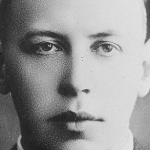





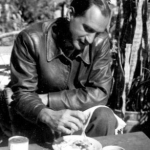
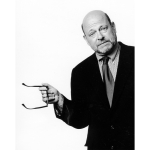


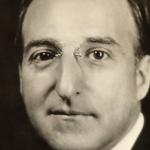




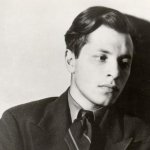
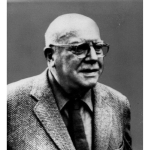

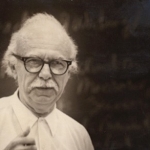

Comment form: